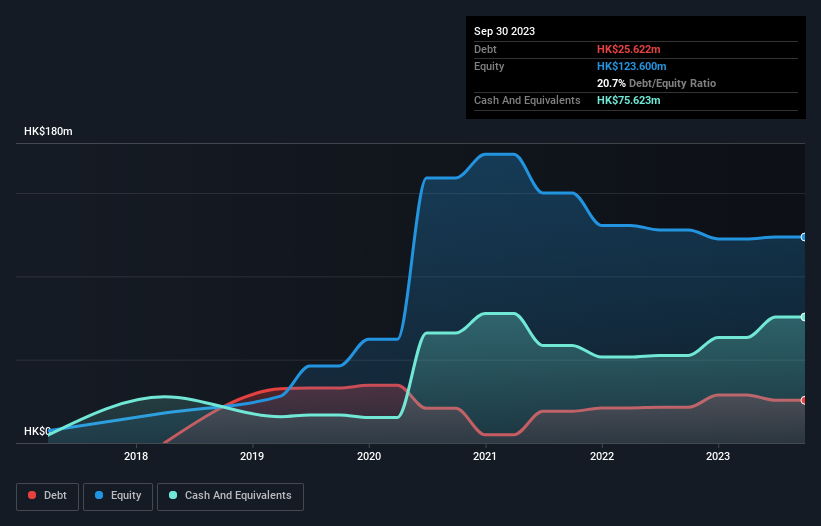
The external fund manager backed by Berkshire Hathaway's Charlie Munger, Li Lu, makes no bones about it when he says 'The biggest investment risk is not the volatility of prices, but whether you will suffer a permanent loss of capital.' So it seems the smart money knows that debt - which is usually involved in bankruptcies - is a very important factor, when you assess how risky a company is. We note that Lotus Horizon Holdings Limited (HKG:6063) does have debt on its balance sheet. But should shareholders be worried about its use of debt?
What Risk Does Debt Bring?
Generally speaking, debt only becomes a real problem when a company can't easily pay it off, either by raising capital or with its own cash flow. Ultimately, if the company can't fulfill its legal obligations to repay debt, shareholders could walk away with nothing. While that is not too common, we often do see indebted companies permanently diluting shareholders because lenders force them to raise capital at a distressed price. By replacing dilution, though, debt can be an extremely good tool for businesses that need capital to invest in growth at high rates of return. The first step when considering a company's debt levels is to consider its cash and debt together.
View our latest analysis for Lotus Horizon Holdings
What Is Lotus Horizon Holdings's Debt?
The image below, which you can click on for greater detail, shows that at September 2023 Lotus Horizon Holdings had debt of HK$25.6m, up from HK$21.5m in one year. However, its balance sheet shows it holds HK$75.6m in cash, so it actually has HK$50.0m net cash.

How Healthy Is Lotus Horizon Holdings' Balance Sheet?
According to the last reported balance sheet, Lotus Horizon Holdings had liabilities of HK$54.2m due within 12 months, and liabilities of HK$3.16m due beyond 12 months. On the other hand, it had cash of HK$75.6m and HK$90.9m worth of receivables due within a year. So it can boast HK$109.2m more liquid assets than total liabilities.
This excess liquidity is a great indication that Lotus Horizon Holdings' balance sheet is almost as strong as Fort Knox. With this in mind one could posit that its balance sheet means the company is able to handle some adversity. Succinctly put, Lotus Horizon Holdings boasts net cash, so it's fair to say it does not have a heavy debt load! When analysing debt levels, the balance sheet is the obvious place to start. But it is Lotus Horizon Holdings's earnings that will influence how the balance sheet holds up in the future. So when considering debt, it's definitely worth looking at the earnings trend. Click here for an interactive snapshot.
In the last year Lotus Horizon Holdings had a loss before interest and tax, and actually shrunk its revenue by 8.5%, to HK$194m. That's not what we would hope to see.
So How Risky Is Lotus Horizon Holdings?
While Lotus Horizon Holdings lost money on an earnings before interest and tax (EBIT) level, it actually generated positive free cash flow HK$10.0m. So although it is loss-making, it doesn't seem to have too much near-term balance sheet risk, keeping in mind the net cash. With mediocre revenue growth in the last year, we're don't find the investment opportunity particularly compelling. The balance sheet is clearly the area to focus on when you are analysing debt. But ultimately, every company can contain risks that exist outside of the balance sheet. We've identified 3 warning signs with Lotus Horizon Holdings (at least 2 which are potentially serious) , and understanding them should be part of your investment process.
If, after all that, you're more interested in a fast growing company with a rock-solid balance sheet, then check out our list of net cash growth stocks without delay.
New: AI Stock Screener & Alerts
Our new AI Stock Screener scans the market every day to uncover opportunities.
• Dividend Powerhouses (3%+ Yield)
• Undervalued Small Caps with Insider Buying
• High growth Tech and AI Companies
Or build your own from over 50 metrics.
Have feedback on this article? Concerned about the content? Get in touch with us directly. Alternatively, email editorial-team (at) simplywallst.com.
This article by Simply Wall St is general in nature. We provide commentary based on historical data and analyst forecasts only using an unbiased methodology and our articles are not intended to be financial advice. It does not constitute a recommendation to buy or sell any stock, and does not take account of your objectives, or your financial situation. We aim to bring you long-term focused analysis driven by fundamental data. Note that our analysis may not factor in the latest price-sensitive company announcements or qualitative material. Simply Wall St has no position in any stocks mentioned.
About SEHK:6063
Lotus Horizon Holdings
An investment holding company, provides design, supply, and installation services for facade works and building metal finishing works in Hong Kong.
Flawless balance sheet low.

